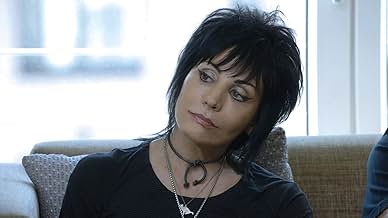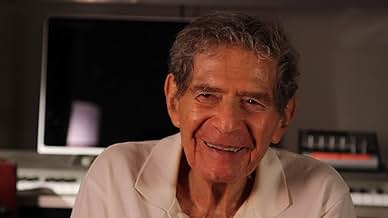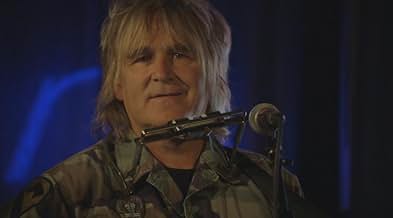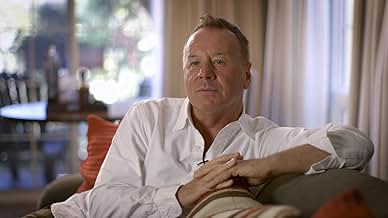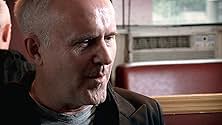Adicionar um enredo no seu idiomaIn 1982, a small radio station battles to bring the New Wave to America.In 1982, a small radio station battles to bring the New Wave to America.In 1982, a small radio station battles to bring the New Wave to America.
M. King Adkins
- Self
- (as Dr. M. King Adkins)
Pete Byrne
- Self - Lead Singer, Naked Eyes
- (as Peter Byrne)
Avaliações em destaque
I got to see Dare to Be Different at a film festival and it was a blast! The sound mix was so good and the music selection so right on that I was dancing in my seat the entire time. It felt as if the entire audience was having a shared musical experience of 80s music and memories. Even though this is the music of my youth, I didn't know that much about the artists who created the 80s sound. It was very engaging to hear artists, now in their 50s and 60s, riff about their early work, their inspirations, and how the era influenced their music and message. The story of the small, rogue, radio station that played this music was an entertaining subplot. Hearing the DJs remember moments when famous artists "hung out" at WLIR or when they literally had to go to the airport to pick up record imports gave the documentary authenticity. I recommend this documentary anyone who loves 80s music.
WLIR, founded in 1959, was the first FM radio station in Long Island, broadcasting mainly showtunes and jazz-pop. In the '70s, WLIR changed their format to Southern and progressive rock, but in 1982 became an underground phenomenon by being the first radio station in the country to play New Wave (mostly coming out of the UK) and post-punk music (in other words, exchanging the Allman Brothers and Blue Öyster Cult for Duran Duran and U2). Thumbing their nose at US record labels--who usually dictated to radio stations what they should be playing--the station became home to a lot of European music acts who were big in their home countries but brand new to Americans. In the days before the internet, radio "found" the new music/tomorrow's hits (for instance, WLIR broke Frankie Goes to Hollywood's "Relax" six months before the rest of the US heard it), and the gratitude from the musicians--many of whom are interviewed here--is genuine and joyous. Something different, to be sure, and very entertaining for music buffs. *** from ****
The music that moved me during the best years of my life. The insight and history of the performers and the songs had me spellbound.
I know for sure that 2 college radio stations in the Boston area, WERS and WMBR, and 2 commercial stations - WBCN in Boston and KROQ in Los Angeles - were among various American radio stations that turned people on to many of the bands that WLIR claimed to have been "the first" to, and by several years. I was annoyed by how DJ's and staff in the film patted themselves on the back in taking such credit. WLIR changed format in 1982. U2's first album was released in the US 2 years earlier and was played at all the stations cited. That's just one example. Sure, WLIR helped expose the music which generated album sales, but don't claim something that is not true. It diminishes the legitimacy of the documentary. I cringed watching it. The listeners and staff obviously dug the commercial alternative format and the filmmaker shows that. I did enjoy seeing musicians that I liked remembering those days. Overall, great that 'LIR dared to be different but don't make false claims that you were the first, etc. And nobody likes a braggart anyway.
I was 15 in 1979 and this was my music growing up so I feel like I understand the history reasonably well. The Cure, Split Enz, Adam & and the Ants, The English Beat, and Devo were at the center of my music world. This documentary doesn't make a lot of sense to me, or at least the spin on how amazingly groundbreaking it was. I'm sure this radio station was a big deal in Long Island, but it just seems really late to the party to me. They make a big deal about being so influential and how MTV could barely have existed without them, but WLIR didn't even change format to New Wave until August 1982 - new wave (and MTV which started a year before WLIR) was well established by then. I listed to KROQ's New Wave format in Los Angeles for many years before WLIR even changed format to New Wave. This is from Wikipedia (about KROQ): "By 1980 the station had fully committed to a post-new wave modern rock orientation." And they say "post-new wave" because they'd been playing New Wave since 1976 and by 1980 it was about time for post-New Wave - WLIR didn't even start playing New Wave until 2 years after KROQ went "post-new-wave." Not exactly groundbreaking from my perspective. I can see looking at some old playlists that they were playing some New Wave songs before the format change, but definitely mixed in with plenty of Stevie Wonder and Bruce Springsteen.
I don't think the documentary knew what it wanted to be. If it wanted to be about the politics and staff of the Long Island radio station, that part of the story doesn't seem very interesting unless you lived there at the time. If they were going to tell a story of a groundbreaking New Wave station, they should have made it about KROQ. If they were going to tell more of a New Wave story, then WLIR could have just been a small segment in the latter part of the documentary.
I will say that the interviews with the Dave Wakeling, Thomas Dolby and others were worth at least fast forwarding to get to, but I can't really recommend the documentary itself. I'm giving it a 5 for probably being interesting to a NY audience and for getting to see some artists on camera that I haven't seen for many years.
I don't think the documentary knew what it wanted to be. If it wanted to be about the politics and staff of the Long Island radio station, that part of the story doesn't seem very interesting unless you lived there at the time. If they were going to tell a story of a groundbreaking New Wave station, they should have made it about KROQ. If they were going to tell more of a New Wave story, then WLIR could have just been a small segment in the latter part of the documentary.
I will say that the interviews with the Dave Wakeling, Thomas Dolby and others were worth at least fast forwarding to get to, but I can't really recommend the documentary itself. I'm giving it a 5 for probably being interesting to a NY audience and for getting to see some artists on camera that I haven't seen for many years.
Você sabia?
- Citações
Michael Pagnotta: It was a movement in technology. And the difference between what Vince Clarke or Martin Gore, as opposed to what Keith Emerson could do, was completely different. The battery of keyboards that Wakeman and Emerson had to have on stage, I was the biggest Yes and the biggest ELP fan, so I love the sound of the Moog synthesizer. But, that was not a portable situation.
- Trilhas sonorasMy Way
(Comme d'Habitude)
Music by Claude François and Jacques Revaux
French lyrics by Gilles Thibaut
English lyrics by Paul Anka
Performed by Sid Vicious
Principais escolhas
Faça login para avaliar e ver a lista de recomendações personalizadas
Detalhes
- Data de lançamento
- País de origem
- Central de atendimento oficial
- Idioma
- Também conhecido como
- Посмей быть другим
- Locações de filme
- Los Angeles, Califórnia, EUA(on location)
- Empresas de produção
- Consulte mais créditos da empresa na IMDbPro
- Tempo de duração1 hora 35 minutos
- Cor
Contribua para esta página
Sugerir uma alteração ou adicionar conteúdo ausente

Principal brecha
By what name was Dare to Be Different (2017) officially released in Canada in English?
Responda

